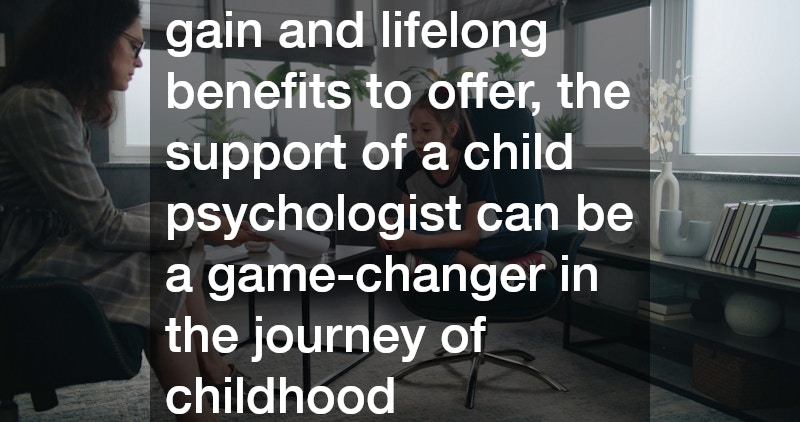Parents naturally want the best for their children, particularly when it comes to emotional and mental wellbeing. In a world where challenges such as academic pressure, social struggles, family transitions and behavioural issues are increasingly prevalent, professional support can make a significant difference. Seeing a child psychologist offers children a safe space to understand and manage their emotions while empowering families with guidance tailored to individual needs. This article explores seven meaningful benefits of working with a child psychologist and how such support can enhance a child’s development.
Improved Emotional Regulation
Children, especially in early developmental stages, often struggle to make sense of their emotions. Outbursts, anxiety, or emotional withdrawal may signal internal confusion or distress. A child psychologist is trained to recognise these signs and help children process their emotions in constructive ways. By teaching children techniques to understand and express feelings appropriately, psychologists support emotional development that lasts well into adolescence and adulthood. When children learn to identify what they are feeling and why, they are better equipped to respond to challenges with resilience and self-awareness.
Support Through Life Transitions
Major life changes can be difficult for children to navigate, whether it involves a move to a new city, the arrival of a sibling, parental separation or a loss in the family. Even when parents do their best to support their child, professional insight can bridge emotional gaps and reduce long-term stress. A child psychologist can provide coping strategies tailored to the child’s age and maturity, ensuring the transition is approached in a healthy way. Addressing these changes early can reduce the risk of anxiety or behavioural concerns developing as a result of unresolved stress.
Early Detection of Developmental Disorders
In many cases, parents may have a sense that something is ‘not quite right’ but are unsure how to proceed. Concerns about speech delays, attention difficulties, hyperactivity or social struggles often emerge during early childhood. A qualified child psychologist can assess developmental milestones and behaviours to determine if there are underlying disorders such as autism spectrum disorder, ADHD or learning difficulties. Early identification is key, as it allows for timely interventions that can significantly improve outcomes both academically and socially. With appropriate support, many children go on to thrive in environments previously thought challenging.
Enhancing School Performance
Academic struggles often have deeper emotional or cognitive roots. A child who is unable to concentrate, constantly acts out, or avoids school altogether may be facing internal barriers that are difficult to verbalise. By working with a child psychologist, students gain strategies to manage performance anxiety, improve organisational skills and develop a positive mindset towards learning. Psychologists often collaborate with teachers and parents to create consistent, structured approaches that reinforce progress across settings. When children feel understood and supported, their confidence in the classroom often improves.
Building Healthy Relationships
Social skills are not innate for every child. Some struggle with making friends, interpreting social cues or managing conflict. These difficulties can lead to isolation or behavioural issues that escalate over time. A child psychologist can help develop interpersonal skills through age-appropriate therapy techniques such as play therapy, role-playing or group interaction exercises. In doing so, children learn empathy, cooperation and assertiveness—skills essential for building and maintaining healthy relationships. Positive peer interactions also enhance self-esteem, which contributes to overall emotional wellbeing.
Strengthening Family Dynamics
Often, the benefits of seeing a child psychologist extend beyond the individual child and influence the entire family. Therapy sessions may include parent involvement, offering guidance on how to support the child at home and manage challenging behaviours more effectively. This collaborative approach fosters mutual understanding and reduces frustration within the family unit. Parents can learn new ways to communicate with their child and develop realistic expectations based on psychological insights. Over time, this strengthens family bonds and encourages a more supportive and nurturing home environment.
Fostering Long-Term Mental Health
Seeking psychological support at a young age can create lifelong advantages. Children who engage in therapy are more likely to develop a positive attitude towards mental health and are often more open to seeking help in the future if needed. Early therapeutic intervention helps children internalise effective coping mechanisms, reducing the risk of mental health concerns such as depression, anxiety, or substance misuse later in life. Seeing a child psychologist during formative years can set the foundation for emotional stability, self-confidence and overall wellbeing into adulthood.
A Proactive Step Towards Resilience
Choosing to consult a child psychologist is not an admission of failure; rather, it is a proactive step towards nurturing a child’s potential. Whether addressing significant behavioural concerns or simply supporting a child through a difficult stage, psychological support empowers families with tools that build emotional intelligence and resilience. In a society that increasingly recognises the importance of mental health, early support for children is one of the most valuable investments a parent can make. With expert guidance, children can grow into emotionally strong, socially capable, and self-aware individuals.
In conclusion, the role of a child psychologist goes far beyond managing problems. It involves nurturing strengths, identifying challenges early, and guiding both the child and their family towards better mental health and stronger relationships. With so much to gain and lifelong benefits to offer, the support of a child psychologist can be a game-changer in the journey of childhood development.

